PHANTOM OF THE PARADISE: A Rock Opera For The Satirical And Subversive
Brian DePalma has become so associated with horror and action fare that it's easy to forget he first made his mark as a director of underground comedies: Greetings and Hi, Mom! were independent hits long before he shocked audiences with the likes of Carrie or Dressed To Kill. The smarmy snobs who lazily branded him a Hitchcock copyist not only overlook the diverse nature of his talents - but they also miss the sense of play and subversive, satirical edge in how he handles his influences and tackles genres.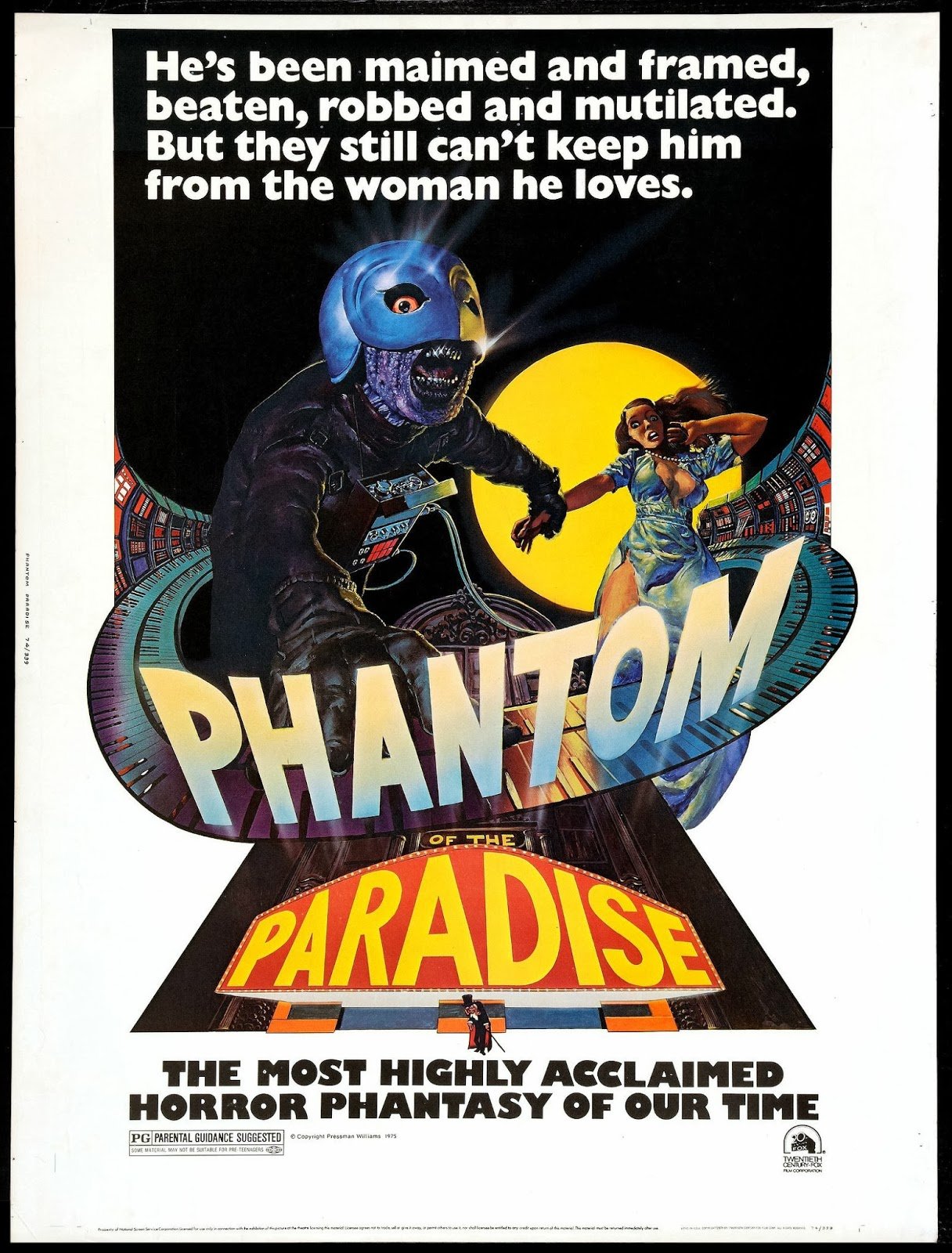 There's even a rock opera in the DePalma filmography - and said film, Phantom Of The Paradise, is the best example of that form ever committed to celluloid. It's a kind of ur-film for DePalma that allows him to unite all his artistic sides - horror, suspense, satire, experimental film styles, Hitchcockian technique - into one densely layered package that demands repeat viewings.The premise revolves around ill-fated songwriter Winslow Leach (William Finley), a composer who is hard at work on a cantata inspired by the story of Faust. One of his songs is overheard by Swan (Paul Williams), a Machiavellian rock producer/impresario who wants to use the tune to open his new venue, the Paradise. Winslow is summarily framed and thrown into prison so Swan can steal his work. He escapes but suffers a terrible accident that destroys his face and voice while trying to sabotage a record press.Swan
There's even a rock opera in the DePalma filmography - and said film, Phantom Of The Paradise, is the best example of that form ever committed to celluloid. It's a kind of ur-film for DePalma that allows him to unite all his artistic sides - horror, suspense, satire, experimental film styles, Hitchcockian technique - into one densely layered package that demands repeat viewings.The premise revolves around ill-fated songwriter Winslow Leach (William Finley), a composer who is hard at work on a cantata inspired by the story of Faust. One of his songs is overheard by Swan (Paul Williams), a Machiavellian rock producer/impresario who wants to use the tune to open his new venue, the Paradise. Winslow is summarily framed and thrown into prison so Swan can steal his work. He escapes but suffers a terrible accident that destroys his face and voice while trying to sabotage a record press.Swan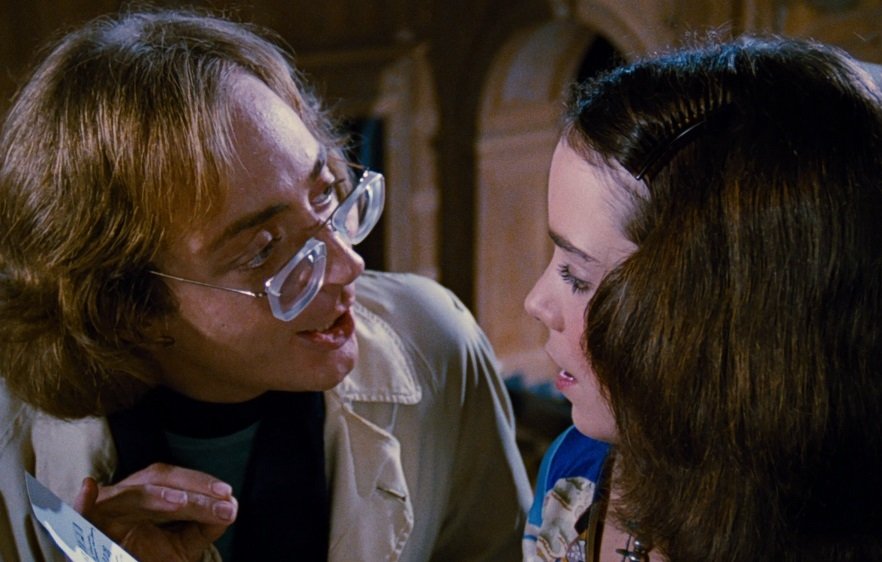 settles into preparations for the opening of the Paradise but he soon discovers that Winslow survived his tragedy - and is now a crafty, scary Phantom of the Opera-type figure dead-set on destroying the Paradise. Swan fast-talks Winslow into rewriting his cantata for the Paradise opening, using Winslow's love for aspiring songstress Phoenix (Jessica Harper) as a bargaining chip. However, when Swan starts pulling his old tricks, Winslow plots revenge anew and discovers that Swan's evil is much older - and more lethal - than the music business itself.
settles into preparations for the opening of the Paradise but he soon discovers that Winslow survived his tragedy - and is now a crafty, scary Phantom of the Opera-type figure dead-set on destroying the Paradise. Swan fast-talks Winslow into rewriting his cantata for the Paradise opening, using Winslow's love for aspiring songstress Phoenix (Jessica Harper) as a bargaining chip. However, when Swan starts pulling his old tricks, Winslow plots revenge anew and discovers that Swan's evil is much older - and more lethal - than the music business itself.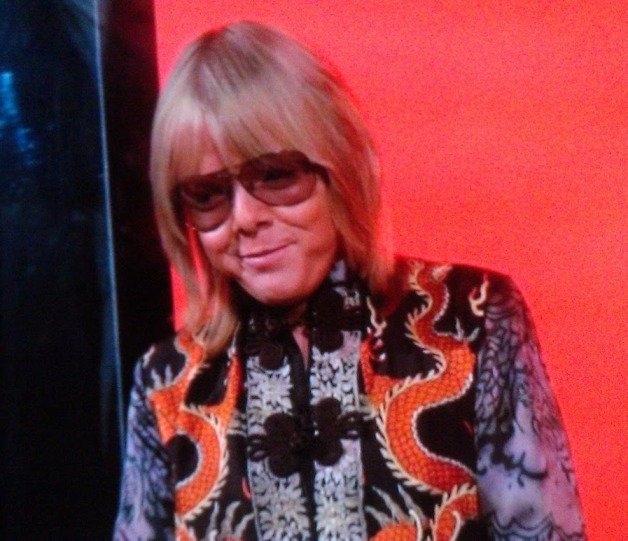 There is nothing that can prepare you for a celluloid juggernaut like Phantom Of The Paradise. DePalma penned the script himself and the storyline moves like a pulp-charged bullet, mixing elements of Faust, Phantom Of The Opera and The Picture Of Dorian Gray into a satire that pokes fun at the music business, Phil Spector and the general showbiz tendency to steamroll over dreamers as it endlessly repackages the same old thing. It's worth noting that the film boasts an endless buffet of quotable dialogue, thus illustrating one of DePalma's most underrated skills as a writer.Better
There is nothing that can prepare you for a celluloid juggernaut like Phantom Of The Paradise. DePalma penned the script himself and the storyline moves like a pulp-charged bullet, mixing elements of Faust, Phantom Of The Opera and The Picture Of Dorian Gray into a satire that pokes fun at the music business, Phil Spector and the general showbiz tendency to steamroll over dreamers as it endlessly repackages the same old thing. It's worth noting that the film boasts an endless buffet of quotable dialogue, thus illustrating one of DePalma's most underrated skills as a writer.Better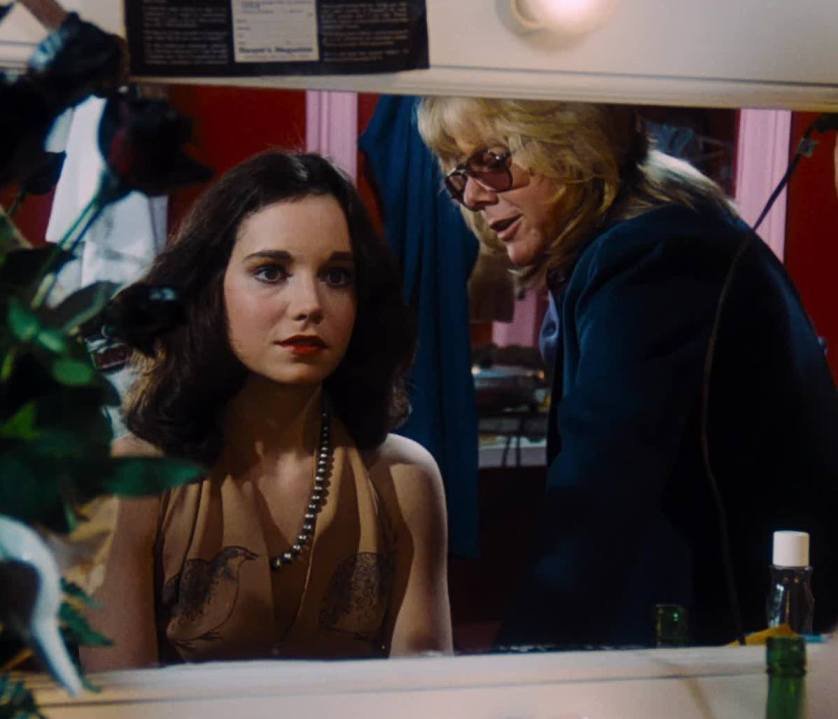 yet, DePalma's crafty, kinetic direction adds another layer of influences and references, including German expressionism, silent film comedy, the Mamoulian version of Dr. Jekyll & Mr Hyde and plenty of Hitchcock, including a finale that evokes The Man Who Knew Too Much and the ultimate send-up of the Psycho shower scene. With the sleek cinematography of Larry Pizer and the stunning pop-art production design of Jack Fisk, DePalma creates an outlandish, day-glo world that looks the way glam rock sounds. The final visual touch is brilliant, punchy editing from Paul Hirsch that slickly modulates the film's energy and wealth of visual/aural ideas. Hirsch also creates a dazzling end credits sequence that chronicles the arc of each major character in just a few
yet, DePalma's crafty, kinetic direction adds another layer of influences and references, including German expressionism, silent film comedy, the Mamoulian version of Dr. Jekyll & Mr Hyde and plenty of Hitchcock, including a finale that evokes The Man Who Knew Too Much and the ultimate send-up of the Psycho shower scene. With the sleek cinematography of Larry Pizer and the stunning pop-art production design of Jack Fisk, DePalma creates an outlandish, day-glo world that looks the way glam rock sounds. The final visual touch is brilliant, punchy editing from Paul Hirsch that slickly modulates the film's energy and wealth of visual/aural ideas. Hirsch also creates a dazzling end credits sequence that chronicles the arc of each major character in just a few 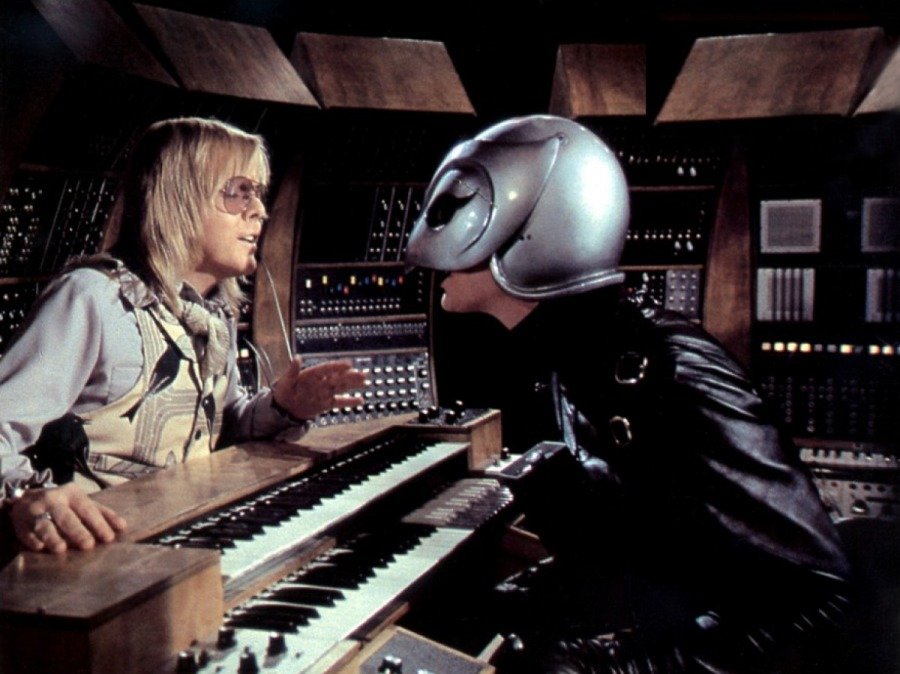 minutes.Phantom Of The Paradise is also bursting at the seams with great performances, boasting a savvy cast that draws heavily from experimental comedy/theater troupes and the musical world. Finley, a regular character actor in DePalma films, shines in a rare leading role, creating a sense of heartbreak beneath the film's satire as we see a character who starts as a lovable naif but is tormented into becoming an insane angel of vengeance. Harper is lustrous as the songbird who inspires him - and her sultry, alto vocal stylings provide some of the best musical moments in the film.There ar
minutes.Phantom Of The Paradise is also bursting at the seams with great performances, boasting a savvy cast that draws heavily from experimental comedy/theater troupes and the musical world. Finley, a regular character actor in DePalma films, shines in a rare leading role, creating a sense of heartbreak beneath the film's satire as we see a character who starts as a lovable naif but is tormented into becoming an insane angel of vengeance. Harper is lustrous as the songbird who inspires him - and her sultry, alto vocal stylings provide some of the best musical moments in the film.There ar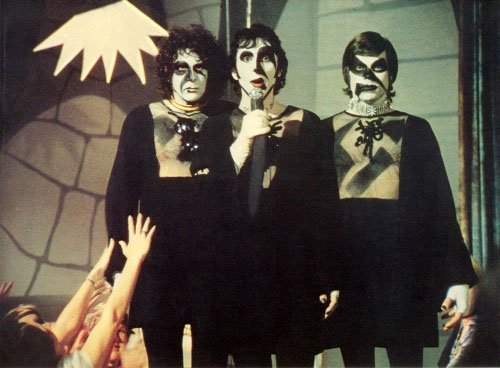 e also scene stealing turns from Gerrit Graham as Beef, an egotistical glam gender-bender whose acidic bon-mot lines are as unforgettable as his costume changes, and George Memmoli, who brings a wonderful sense of deadpan wit to his role as Swan's Teamster-esque right-hand man, Philbin. Special praise should go to Archie Hahn, Jeffrey Comanor and Peter Elbling (a.k.a. Harold Oblong), a trio of gifted comedians/musicians who jump from genre to genre to interpret the style of Swan's different bands: Sha Na Na, the Beach Boys, Alice Cooper - they do it all...
e also scene stealing turns from Gerrit Graham as Beef, an egotistical glam gender-bender whose acidic bon-mot lines are as unforgettable as his costume changes, and George Memmoli, who brings a wonderful sense of deadpan wit to his role as Swan's Teamster-esque right-hand man, Philbin. Special praise should go to Archie Hahn, Jeffrey Comanor and Peter Elbling (a.k.a. Harold Oblong), a trio of gifted comedians/musicians who jump from genre to genre to interpret the style of Swan's different bands: Sha Na Na, the Beach Boys, Alice Cooper - they do it all...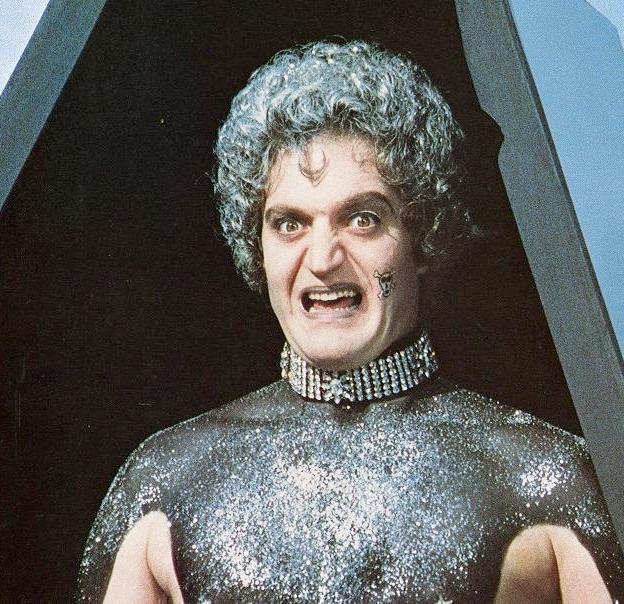 That said, DePalma's key collaborator on the film - both in acting and in music - is the great Paul Williams. As Swan, he draws on several years of music-biz experience to create a sinister yet witty and oddly charming villain. The way Williams plays the role, you can understand why people fall for his ruses again and again - and later in the film, he reveals some hidden dramatic levels when the character's past history is explored. Better yet, his score for the film is phenomenal, mixing songs of stunning beauty and melancholy with pitch-perfect satirical pastiches or rock styles (George Tipton's silent film-style underscore is also beautifully composed and arranged).Simply put, this is the ultimate rock opera, the movie that The Rocky Horror Picture Show wishes it could be. It wraps up satire, pathos, killer music and stunning visuals into a kinetic dazzler that never stops delivering the goods. As a result, it's one of the most unique achievements in DePalma's still-underrated filmography and required viewing for any self-styled cult movie fanatic.
That said, DePalma's key collaborator on the film - both in acting and in music - is the great Paul Williams. As Swan, he draws on several years of music-biz experience to create a sinister yet witty and oddly charming villain. The way Williams plays the role, you can understand why people fall for his ruses again and again - and later in the film, he reveals some hidden dramatic levels when the character's past history is explored. Better yet, his score for the film is phenomenal, mixing songs of stunning beauty and melancholy with pitch-perfect satirical pastiches or rock styles (George Tipton's silent film-style underscore is also beautifully composed and arranged).Simply put, this is the ultimate rock opera, the movie that The Rocky Horror Picture Show wishes it could be. It wraps up satire, pathos, killer music and stunning visuals into a kinetic dazzler that never stops delivering the goods. As a result, it's one of the most unique achievements in DePalma's still-underrated filmography and required viewing for any self-styled cult movie fanatic.


